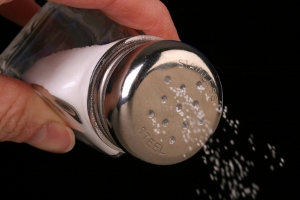Most of us already know that too much salt isn’t a good thing. Yet what’s surprising is that despite decades of warnings to reduce sodium intake, Americans continue to over-consume the flavorful staple in most households. A new Harvard study shows that our salt intake really hasn’t changed over the past 50 years, and it seems like that intake is hardwired and not easy to change no matter how many PSAs or dietitian visits we have.
 As more processed foods hit our shelves and as obesity rates continue to soar, it almost seems as though sodium levels would have continued to increase, not necessarily stay the same. Yet, after multiple studies were reviewed, all occuring between 1957 and 2003, it appears that 3700 milligrams of sodium was consistently consumed over the years. Of course, other measures of our sodium intake don’t necessarily reflect the same pattern. In fact, the NHANES, or National Health and Nutrition Examination Survey, does indeed show an increase in salt consumption. The biggest difference between these survey results and that observed in the Harvard study is that the NHANES relies on food records where as the Harvard study took a look at urinary sodium output which is supposedly more accurate.
As more processed foods hit our shelves and as obesity rates continue to soar, it almost seems as though sodium levels would have continued to increase, not necessarily stay the same. Yet, after multiple studies were reviewed, all occuring between 1957 and 2003, it appears that 3700 milligrams of sodium was consistently consumed over the years. Of course, other measures of our sodium intake don’t necessarily reflect the same pattern. In fact, the NHANES, or National Health and Nutrition Examination Survey, does indeed show an increase in salt consumption. The biggest difference between these survey results and that observed in the Harvard study is that the NHANES relies on food records where as the Harvard study took a look at urinary sodium output which is supposedly more accurate.
Current guidelines for sodium intake are 2300 milligrams a day for healthy adults and 1500 milligrams a day for those at risk of high blood pressure. That’s quite a difference. And although this message has been touted for over twenty years, it appears that few are following it or that these recommendations are too stringent for the majority of Americans.
Elevated sodium intake isn’t just occurring in American populations though. In fact, the average sodium intake appears to be similar on an international level. This means that there may be more to this whole sodium intake thing than we think. It also begs the question- are our recommendations wrong?
Although sodium intake may be naturally higher than what the recommendations suggest, that doesn’t mean we should throw the baby out with the bathwater. It’s never a bad idea to consider whether you are consuming too much of something. Since sodium is quite prevalent in many of the foods found on store shelves, it’s easy to over do it and too much sodium isn’t good for your heart or your health. So, be sodium wise and do your best to stick with a moderate intake.
To do so, there are many simple tips you can incorporate into your day to reduce overall sodium intake.
Make Friends with Your Spice Rack. Salt isn’t the only flavoring on the block. Oregano, thyme, rosemary, garlic, cinnamon, chives, basil, and ginger are just a few of the many various herbs and spices that could be lining your kitchen counter. They are sodium free and can add unique flavors when used alone or in combination.
Read Your Food Label. Processed foods are often loaded with sodium. Check your labels to see how much sodium is in a serving. If it’s more than 140 milligrams, you could probably do better.
Think Fresh or Frozen. Canned vegetables and soups can also be high in sodium. Look for low-sodium options or stick with fresh or frozen varieties. They are often lower in sodium, but full in flavor.
Keep Fast Food Outings to a Minimum. Fast food is also high sodium. Don’t frequent fast food restaurants and you’ll automatically cut down on your sodium intake. If you can’t resist your favorite fast food joint, keep portions small and consider ordering the smallest items on the menu.
Be Careful with Fat-Free and Low-Fat Options. Many times when foods are fat-reduced, food manufacturers replace that fat with “fillers.” Sodium is often chosen because of its ability to add flavor. Again, read your labels carefully and choose wisely.
Whether the recommendations are correct or not, keeping your nutrients in the correct balance is important. By reducing your sodium intake, you are often required to choose other foods that have many health benefits awaiting you.
Also Read:
5 Surprisingly High Sodium Foods
